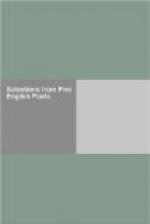NOTE.—The Deserted Village, published in 1770, was immediately popular, and to-day few English poems are so widely read or so often quoted. If the poet had in mind any special place when writing of “Sweet Auburn,” it was probably Lissoy, in Ireland, where he grew up; but the village of his imagination is lovelier than any actual spot, and there is no use in hunting for it on the map. See the first note on The Traveller for remarks on metre, etc.
[1.] Decent, appropriate, fitting. Consult the dictionary for the present meanings of the word.
[2.] Lawn, a cleared space in a wood.
[3.] One only master, etc. Sometimes, in England or in Ireland a wealthy man would buy a large tract of land, pull down the house and turn the entire region into parks or hunting grounds. Such a man was not necessarily a tyrant. In many cases the villages demolished were deserted because the inhabitants had left them to seek more comfortable homes across the ocean.
[4.] Decay, i.e. deteriorate, lose their high moral character. Although this is not the inevitable consequence of great wealth, it is certainly one of its dangers.
[5.] A breath can make them. Breath was used by older writers in the sense of words. The poet’s meaning is, that kings can easily make new lords by conferring titles upon their favorites. This was a common practice in former times. Now, in England, titles are usually given as a reward for distinguished merit, as in the case of Alfred Lord Tennyson, the famous poet.
[6.] Ere England’s griefs began. The student of history finds that there never was such a time. Although there are serious evils in all civilized countries to-day, especially in the condition of the poorest people in large cities, the workingman is, on the whole, far better off than he was hundreds of years ago, or even at the beginning of the nineteenth century.
[7.] To husband out, to use or manage with economy. The out is superfluous in prose.
[8.] An hare. An was formerly used before words beginning with h, even when that letter was sounded, and also before words beginning with a vowel.
[9.] Pants to, eagerly longs for.
[10.] No surly porter, etc. While the poet was exaggerating when he said this, nevertheless it is true that the feeling of responsibility for poor and the unfortunate was less widespread among the well-to-do in his day than it is now.
[11.] The village preacher’s, etc. There is no doubt that the poet was thinking of his own father when he drew the sketch that follows—one of the most charming character sketches in English literature. To find its like in poetry one must go back to Chaucer’s picture of the “poor parson” in the Prologue to the Canterbury Tales. Goldsmith’s “village preacher” first appeared in the Vicar of Wakefield, in that delightful character, Parson Primrose.




